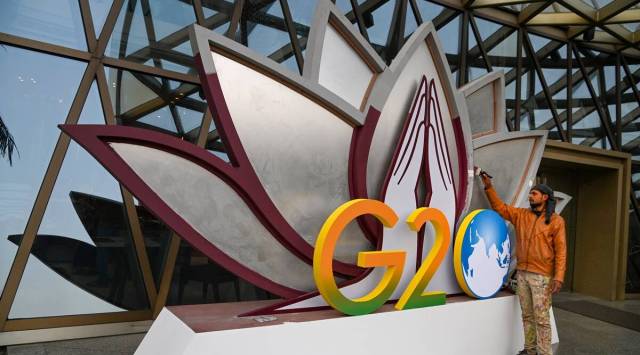
G20 in India
India hosted the G20 Summit this year from September 8 to September 10 in New Delhi. The African Union was invited to join the group. There was a consensus on the New Delhi Declaration, which notably did not condemn Russia but called for peace in Ukraine. The media in Pakistan commented on the declaration and urged its administration to sort out internal issues so as to be able to participate in global decision-making bodies.
Dawn (September 12) recapitulated the significant happenings at the summit and said, “The sad reality is that in the international arena, economic heft overshadows morality… if we want to be part of these global trade networks, and if we want our voice heard where issues such as Kashmir are concerned, we need to first address our internal inadequacies.”Express Tribune (September 11) said, “There was a lot of jargon and window-dressing too as the summit was dubbed as ‘One Earth, One Family, One Future,’ simply making it a point of consensus on issues.” On the joint declaration, the Tribune said, “[It] stopped short of calling a spade a spade as volatile subjects such as aggression over Kyiv, occupation of Palestine and grave human rights violations in Kashmir went unnoticed.”
Pakistan’s Chief Justice retires
On September 16, the 28th Chief Justice of Pakistan, Justice Umar Ata Bandial, retired. The media recounted his term in office saying his tenure “saw a heavy judicialisation of politics” (News International, September 16).
Daily Times (September 15) says that Justice Bandial’s actions “cannot be described as having ‘sat back’”. Instead, “Fiery speeches, alarming leaked conversations and partisan salutations would go down as the highlight of his time in the highest echelon of legal power.” News International (September 16) says, “while the ‘political’ part of the CJ Bandial court may divide opinion, the outgoing judge is also leaving behind a reputation of being an otherwise ‘soft-spoken’ judge known for his competence and legal acumen and who perhaps was left grappling with matters that became ‘a trying contest’”.
Rising petrol prices
The caretaker government increased the price of petrol and diesel by Rs 26.02 and Rs 17.34 respectively, bringing the cost of petrol up to Rs 330 per litre. This may create a transport issue for more people who are unable to afford fuel.
Dawn (September 17) says, “One immediate solution can be opting for public transportation to save on fuel costs. But while this may be doable in Punjab’s large cities, which have worked on modern transportation systems, this solution is not applicable in Sindh.” The Nation (September 17) speaks to the potential reasons for this increase saying, “The government may be recovering losses accumulated through unsustainable subsidies over the course of generations… Supply has failed to recover from historically low levels despite the addition of refining capacity in the Middle East and China… It is unfortunate that the impact of such global trends is so dire in Pakistan.”
Express Tribune (September 17) demands accountability for this move from the government saying, “Isn’t the government aware of public misery, and under what estimates can it keep on burdening the masses for the consistent failure of its policies? Is there any subsidy or remedy from this spiraling equation? Where did the cheap Russian crude end up? It is simply unacceptable the way the public is being fleeced.”
Pakistan’s airline debacle
Five aircrafts from the Pakistan International Airlines’ (PIA) fleet have been grounded. This is yet another crisis for the already in-trouble company that is funded by the government. The media is urging the aviation department to reconsider its ties with the PIA.
Daily Times (September 15) talks about the persistent issues with PIA saying, “Sandwiched between protest calls by employee pressure groups and the vested interest of those who sat in the corridors of power, the state has never shown the guts to proclaim it is in no shape to throw lifelines at the bankrupt airline.” The Nation (September 15) says, “We have spent far too long trying to save this airline and in the process, we have wasted billions of rupees that could have been spent on something more worthwhile. It is essential that the prospective government takes this into account and devises a strategy that corrects our lackadaisical approach to reforms to the PIA.”
Abaya ban in France
Last month, the Emmanuel Macron-led French government announced that it was banning the abaya and qamis in schools in the name of secularism. The Action for the Rights of Muslims (ADM) association filed a motion for injunction against the ban. But last week, the French Supreme Court upheld the ban.
News International (September 11) discusses the consequences of this for Muslim school girls saying, “Those who see education of Muslim women as a threat to ultra-conservative religious notions are likely to push parents to stop sending their girls to school, and all of this will deprive young girls of a better and independent future.”
adya.goyal@expressindia.com